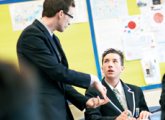Way back in 1913, French agricultural engineer Maximilien Ringelmann discovered something rather surprising: the productivity of a group decreases as its size increases. If we are set to pull a rope all by ourselves, for example, we tend to tug our hardest – but as soon as others pop up to help us out, everyone starts pulling a bit less hard, even though they are likely to be unaware of this lessening of effort. Moreover, the bigger the group, the greater the tendency is towards this kind of ‘social loafing’.
The Ringelmann Effect, then, suggests that when we become part of a group we believe every other member is doing the hard work. This makes us feel that wecan take it easy, because our lack of effort will not be exposed; we rely on those around us to pull out the stops to get the job done. It’s a phenomenon that’s long been well known to teachers – it ought to be reasonable, the casual observer might think, to expect a group of four pupils to produce four times as much work collectively as they would generate alone, but as every educator will tell you, the reality is that they tend to come up with less together than they would working as individuals.
Not only that, there’s also a compelling body of evidence that working in groups makes us lesscreative. In particular, it appears that ‘brain-storming’ – or its politically correct synonym, ‘thought-showering’ – actually limits our capacity to come up with interesting ideas.
So why do we bother? Why have pupils work together at all?
Talking points
We’ve all encountered pupils who struggle to answer questions, still less come up with original notions of their own. Left to their own devices they are more likely than not simply to sit, head on desk in an expanding puddle of drool. Merely getting them to discuss some possibilities with the student sitting next to them can be sufficient to jolly them along. Maybe they haven’t become more creative – perhaps this just gives them less of an excuse for doing nothing? Who cares: it gets them working. And perhaps they might even surprise us in the end – I’m sure we can all cite plenty of examples from our own lives of occasions when a simple conversation with a friend or colleague has opened up new possibilities or pointed us in previously unexplored directions.
So, whilst group brainstorming may not be all it’s often cracked up to be, if we remember that talking to other people about our ideas is hugely important, then we should be well on our way to accepting that learning is essentially social. We don’t tend to learn effectively by being left to discover things in isolation. Yes, of course, we canlearn by ourselves; generally from reading written texts. Which someone else has written. It’s not too great a stretch to agree that the acts of reading and writing are essentially similar to the acts of speaking and listening, and that reading is just another way to join the conversation of mankind.
Everyone counts
Effective group work requires two ingredients: collaborative goals and individual accountability. If we have one without the other, then the group work will not be effective. I suspect that, generally speaking, as teachers we are pretty good at creating group work where the first condition is met – but far less accomplished at ensuring accountability.
Pre-selecting a student to report back to the class is a popular move, but a bad error. It means only one group member will be accountable and that everyone else has licence to muck about. If, however, you don’t say who will be reporting until after the task is completed – well then, everybody is kept on his or her toes.
Other, cunning ways to increase accountability include setting a group task, followed by an assessment in which every member of the team will be awarded the marks of the lowest performing member of the group. Boom! Instant accountability for work-shy toerags!
Or what about the class Home/Expert model? A Home group is given a collective goal; each member of the Home group is then assigned an expert role and must take responsibility for working in Expert groups on their specialisation; experts then reassemble as a Home group. If the goal has been designed so that it requires the expertise of each member to be completed, then everyone will be highly accountable and any slackers will be exposed as the lowly reprobates they are.
Class action
Whatever your view on getting children to work together, it’s worth considering that all classes are ‘groups’ and as teachers, we need them to function. A roomful of 30 individuals working in silence on a controlled assessment is still a group and a teacher will have had to put a lot of effort in to create the conditions for the individuals in it to work effectively. The collaborative goal (that the group is functional) may be fairly loose, but it’s still an aim that requires the cooperation of everyone involved. Most of us have experienced the sense of creeping dread at the approach of a regular lesson with thatYear 9 group on a Friday afternoon; this dysfunction comes from prioritising individual accountability over collaborative goals. The collaboration must be addressed before the group can work. Failure to deal with poor behaviour will mean we preside over a horribly stressful situation for everyone involved.
So, group work is not a panacea. It won’t make pupils more creative or work harder but it should, if done well, change the social norms in a class to ensure that all can learn to the very best of their individual ability.
David has run two english departments and been an assistant head with responsibility for teaching and learning. he is the author of the best- selling 'the perfect english lesson' and his latest title, 'the secret of literacy'.
- Browse by subject
- Maths & Science
- English & MFL
- Humanities
- The Arts
- I.C.T
- Outdoor Learning









